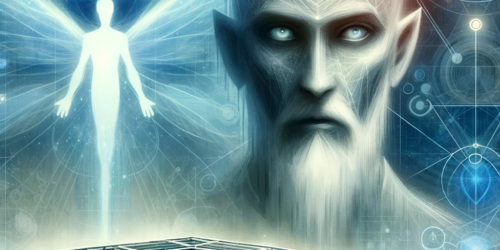Cosmic Consciousness: A Study in the Evolution of the Human Mind

Richard Maurice Bucke’s seminal work, “Cosmic Consciousness: A Study in the Evolution of the Human Mind,” presents a compelling exploration of the evolution of human consciousness, projecting an imminent leap forward in the progression of human cognition. Below are the key takeaways and claims in this groundbreaking book:
- The Evolution of Consciousness: Bucke proposed a model of human consciousness development across three stages: simple consciousness, self-consciousness, and cosmic consciousness. Simple consciousness is an awareness of the environment and is present in most animals. Self-consciousness involves self-awareness and the ability to reflect, present in humans and potentially a few other species. Cosmic consciousness is the next stage of evolution, according to Bucke, characterized by a profound awareness of the cosmos and an intuitive understanding of the universe’s workings.
- Characteristics of Cosmic Consciousness: Bucke described those with cosmic consciousness as experiencing a sensation of immortality, a loss of the sense of sin, a loss of the fear of death, and a sudden sense of enlightenment, among others. He hypothesized that this state leads to a moral uplift and intellectual illumination.
- Cosmic Consciousness Attainees: Bucke claimed that several historical figures had reached this state of cosmic consciousness, including Jesus Christ, Buddha, Mohammed, Dante Alighieri, Francis Bacon, William Blake, and his friend Walt Whitman, among others. He extensively analyzed their works and biographies to substantiate his claims.
- The Imminent Evolution: Bucke proposed that humanity was on the brink of evolving en masse to attain cosmic consciousness. This new form of consciousness, he believed, was sporadic in the past, but would become common in the future, leading to a profound societal transformation.
- An Unexplainable Phenomenon: Bucke acknowledged that the onset of cosmic consciousness, often depicted as a mystical or epiphany-like experience, could not be readily explained by science as it stood in his time. He maintained, however, that its inexplicability did not negate the authenticity or the transformative power of such experiences.
- Ethical and Moral Implications: Individuals with cosmic consciousness, according to Bucke, exhibit a high degree of ethical awareness and moral sensibility. This elevated moral sense isn’t merely due to intellectual understanding or social learning but is a direct consequence of the cosmic conscious experience. Bucke suggested that as more individuals attain cosmic consciousness, society would likely become more ethically evolved and harmonious.
- Inherent Limitations of Language: Bucke was aware that language was an inadequate tool for conveying the depth and breadth of the cosmic consciousness experience. He used metaphorical and poetic language, relying heavily on the firsthand accounts of individuals he deemed to have attained this level of consciousness, to bring as much understanding as possible to his readers.
- Universal Connectivity: One of the fundamental insights from cosmic consciousness, as described by Bucke, is a profound sense of oneness or interconnectedness with the universe. This perception transcends intellectual comprehension, offering an intuitive, direct understanding of the universe’s unity.
As for literature that discusses Bucke’s work:
- “Self and Society: Studies in the Evolution of Culture” by Michael Robert Starks: This book analyzes Bucke’s ideas within the context of other evolutionary theories about human culture. Starks emphasizes the potential societal implications of a mass evolution to cosmic consciousness.
- “Transpersonal Psychologies: Perspectives on the Mind from Seven Great Spiritual Traditions” by Charles T. Tart: This book provides perspectives on Bucke’s work from various spiritual traditions, highlighting the commonalities between those traditions and Bucke’s concept of cosmic consciousness.
- “Walt Whitman’s Mystical Ethics of Comradeship: Homosexuality and the Marginality of Friendship at the Crossroads of Modernity” by Juan A. Herrero Brasas: In this book, Brasas explores the relationship between Bucke and Walt Whitman, arguing that their close relationship provided essential material for Bucke’s concept of cosmic consciousness.
- “The Varieties of Religious Experience” by William James: This book, while not exclusively about Bucke’s work, looks into mystical experiences similar to Bucke’s cosmic consciousness. James, a contemporary of Bucke, presents a psychological perspective on religious experiences, validating them as genuine phenomena.
- “Waking Up: A Guide to Spirituality Without Religion” by Sam Harris: Neuroscientist and philosopher Sam Harris explores consciousness and spirituality from a secular perspective. He references Bucke’s work to support the idea that profound, transformative experiences do not need to be grounded in religious doctrine.
- “Cosmic Consciousness Revisited: The Modern Origins and Development of a Western Spiritual Psychology” by Robert M. May: This book specifically revisits and evaluates Bucke’s concept of cosmic consciousness. May examines Bucke’s thesis in light of developments in transpersonal psychology, a field that emerged well after Bucke’s time.
Bucke’s “Cosmic Consciousness” is an ambitious work that continues to spark interest and debate. His ideas, rooted in the 19th century’s zeitgeist but reaching into the future, provoke readers to reconsider the nature of consciousness and its potential evolution. Bucke’s conviction in humanity’s potential for spiritual and moral advancement remains a beacon of optimism, encouraging ongoing explorations in the field of consciousness studies.



